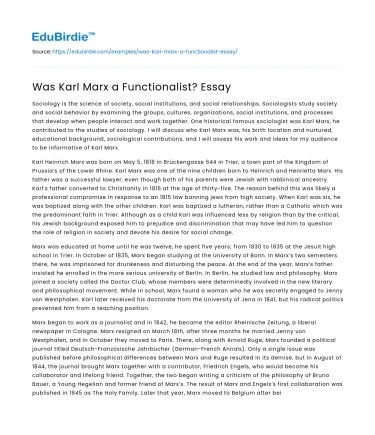Sociology is the science of society, social institutions, and social relationships. Sociologists study society and social behavior by examining the groups, cultures, organizations, social institutions, and processes that develop when people interact and work together. One historical famous sociologist was Karl Marx, he contributed to the studies of sociology. I will discuss who Karl Marx was, his birth location and nurtured, educational background, sociological contributions, and I will assess his work and ideas for my audience to be informative of Karl Marx.
Karl Heinrich Marx was born on May 5, 1818 in Brückengasse 644 in Trier, a town part of the Kingdom of Prussia’s of the Lower Rhine. Karl Marx was one of the nine children born to Heinrich and Henrietta Marx. His father was a successful lawyer, even though both of his parents were Jewish with rabbinical ancestry. Karl’s father converted to Christianity in 1816 at the age of thirty-five. The reason behind this was likely a professional compromise in response to an 1815 law banning jews from high society. When Karl was six, he was baptized along with the other children. Karl was baptized a lutheran, rather than a Catholic which was the predominant faith in Trier. Although as a child Karl was influenced less by religion than by the critical, his Jewish background exposed him to prejudice and discrimination that may have led him to question the role of religion in society and devote his desire for social change.
Save your time!
We can take care of your essay
- Proper editing and formatting
- Free revision, title page, and bibliography
- Flexible prices and money-back guarantee
Marx was educated at home until he was twelve, he spent five years; from 1830 to 1835 at the Jesuit high school in Trier. In October of 1835, Marx began studying at the University of Bonn. In Marx’s two semesters there, he was imprisoned for drunkeness and disturbing the peace. At the end of the year, Marx’s father insisted he enrolled in the more serious university of Berlin. In Berlin, he studied law and philosophy. Marx joined a society called the Doctor Club, whose members were determinedly involved in the new literary and philosophical movement. While in school, Marx found a woman who he was secretly engaged to Jenny von Westphalen. Karl later received his doctorate from the University of Jena in 1841, but his radical politics prevented him from a teaching position.
Marx began to work as a journalist and in 1842, he became the editor Rheinische Zeitung, a liberal newspaper in Cologne. Marx resigned on March 18th, after three months he married Jenny von Westphalen, and in October they moved to Paris. There, along with Arnold Ruge, Marx founded a political journal titled Deutsch-Französische Jahrbücher (German-French Annals). Only a single issue was published before philosophical differences between Marx and Ruge resulted in its demise, but in August of 1844, the journal brought Marx together with a contributor, Friedrich Engels, who would become his collaborator and lifelong friend. Together, the two began writing a criticism of the philosophy of Bruno Bauer, a Young Hegelian and former friend of Marx’s. The result of Marx and Engels’s first collaboration was published in 1845 as The Holy Family. Later that year, Marx moved to Belgium after being expelled from France while writing for another radical newspaper, Vorwärts!, which had strong ties to an organization that would later become the Communist League. In Brussels, Marx was introduced to socialism by Moses Hess, and finally broke off from the philosophy of the Young Hegelians completely. While there, he wrote The German Ideology, in which he first developed his theory on historical materialism. Marx couldn’t find a willing publisher, however, and The German Ideology along with Theses on Feuerbach, which was also written during this time were not published until after his death. At the beginning of 1846, Marx founded a Communist Correspondence Committee in an attempt to link socialists from around Europe. In 1848, he published The Communist Manifesto with Friedrich Engels and was banished to London, where he wrote the first volume of Das Kapital. Marx had many sociological contributions that targeted many effects and areas of how socialism, communism, and capitalism, and influenced society. He was known by his founding of his work, he called “Marxism.” Marxism is the study of contradiction between human nature and the way people should perform in a capitalist society.
Even though, Karl had a few obstacles in his career, he was one of the most influential figures of sociology. Plenty of Karl’s work did not get completed, he believed people were all the same just in different classifications. He also believed that each individuals should have been treated as an individual. The characteristics of each individual showed how their actions acted when combined with another. Karl was taught that if everything was taken away from each individual and given the same strategy then they all would do the same things. Mentioning back to the study of sociology, Marx studied how individuals acted and how individuals act within, he learned over the years that those given the power, they abuse it and others whom they abuse. Karl Marx died on March 14, 1883 in London. Marx died of pleurisy caused by acute bronchitis. Karl Marx was one of many historical figures of sociology. Sociology is still a perpetual learning content and as centuries goes on there will still be factors to study and acknowledge. Thanks to Karl Marx’s for his work and the studies of sociology can be furthered.






 Stuck on your essay?
Stuck on your essay?

